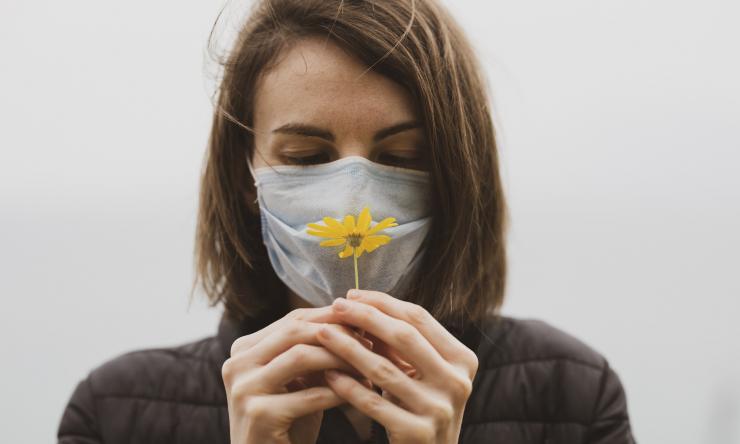Relearning to smell after COVID-19
Many people recovering from COVID-19 have reported prolonged loss of smell. For some, the symptom may last several months after other symptoms resolve. Otolaryngologists at Baylor College of Medicine share how they are helping patients relearn to smell.
Smell loss has been linked to other viral illnesses but was relatively rare before the COVID-19 pandemic. Current research shows this symptom may be more common in COVID-19 patients because the SARS-CoV-2 virus binds to receptors found in the part of the nose that controls smell, according to Dr. Sunthosh Sivam, assistant professor of otolaryngology – head and neck surgery at Baylor.
“In most cases, smell loss is temporary, but it can take months or even years to recover,” said Dr. Tran Locke, assistant professor of otolaryngology – head and neck surgery at Baylor. “If you have any type of smell at all, it’s a sign that your olfactory nerve is still working.”
Both doctors recommend that anyone experiencing prolonged smell loss after recovering from COVID-19 make an appointment to see an ear, nose and throat specialist to rule out other potential causes.
“Seasonal allergies or inflammatory sinus disease would also impede your smell baseline and your ability to recover from the effects of an infection like COVID-19,” Sivam said. “We want to minimize any inflammatory issues first.”
Physical therapy for your nose
Patients may be prescribed nasal steroids or rinses to address inflammation. If the problems persist, Sivam and Locke introduce patients to olfactory retraining. They call it physical therapy for your nose. Patients are instructed to gently smell different essential oils or herbs with familiar scents for 20 seconds while focusing on their memories and experiences with that scent. Commonly used scents are rose, lemon, clove and eucalyptus, but patients can choose scents based on their preference. The practice should be repeated twice a day for four to six months.
“It takes patience. The more you train, the better the outcome will be,” Locke said. “I recommend patients find a quiet place where they won’t be disturbed so they can give their full attention to the practice.”
Sivam says that olfactory retraining requires dedicated effort, and patients should manage their expectations before starting the regimen. He cautions that recovering smell may not mean returning to the same level of smell as before the COVID-19 infection.
“When you smell a rose scent, your characterization may be different than before you had the smell loss,” Sivam said. “You’re relearning what a rose smells like with your new smelling status. I talk with my patients about building a new smell vocabulary.”
Many patients who experience loss of smell after COVID-19 also report loss of taste. Locke says the two senses are closely linked. The tongue can sense salt, sweet, bitter, sour and savory foods. Odor from the food wafts into the nose from the back of the throat and combines with the sense of taste to give the full flavor. Losing the sense of smell will result in dulled taste, according to Locke.
Research into smell loss and ways to reverse it is expanding as more COVID-19 patients report this symptom. Sivam and Locke will discuss the research on possible treatments with their patients and make recommendations on a case-by-case basis. But they say it’s important to consult with your doctor before trying anything.
“If you have no smell for two weeks, it’s important to come in and get checked out,” Locke said. “It could be due to COVID-19. It could be unrelated. Either way, I think having a doctor evaluate the condition is important to avoid self-treatment resulting in a delay in diagnosis.”
Those interested in seeing Drs. Locke or Sivam to address smell loss can make an appointment by calling 713-798-5900. Learn more about Baylor Medicine Otolaryngology here.
###











